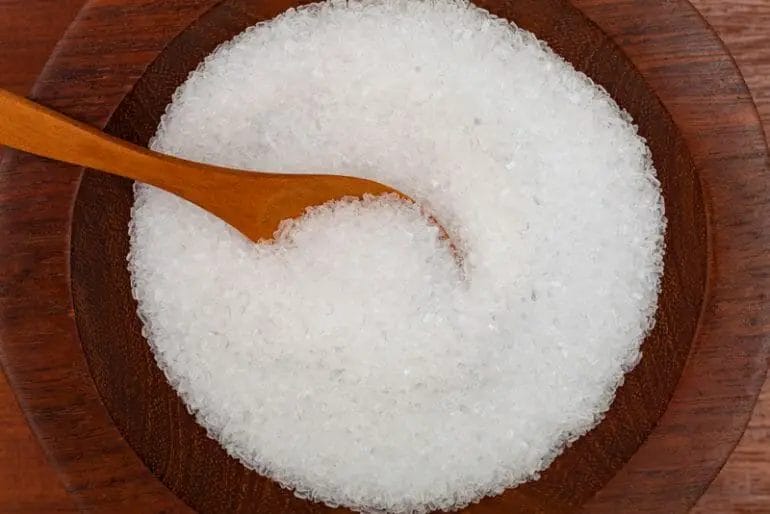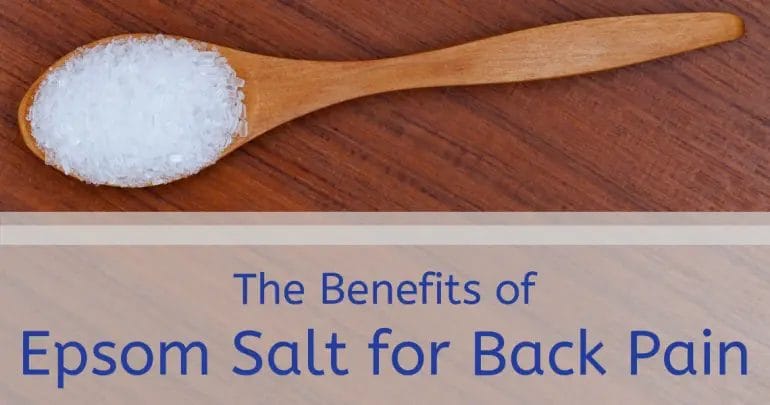Epsom salt, also known as magnesium sulfate, can be beneficial for zucchini plants.
The high magnesium content in Epsom salt can help improve the overall health and productivity of zucchini plants.
It aids in chlorophyll production, which is essential for photosynthesis, resulting in greener and healthier foliage.
Epsom salt can also prevent nutrient deficiencies in zucchini plants by enhancing nutrient uptake and absorption.
However, it’s crucial to use Epsom salt in moderation and follow proper application guidelines to avoid harming the plants.
Consulting with a gardening expert or conducting soil tests can help determine if Epsom salt is suitable for your zucchini plants.

How to apply Epsom salt to improve zucchini plant health
Zucchini plants are a popular choice for home gardeners due to their ease of growing and abundance of delicious fruits. However, like any plant, zucchini may encounter issues that affect their growth and health. One effective way to improve the overall health of zucchini plants is by applying Epsom salt.
Epsom salt, also known as magnesium sulfate, is a natural substance that is rich in magnesium and sulfur. These nutrients play a crucial role in plant health and development. Here are some steps to follow when applying Epsom salt to your zucchini plants:
Step 1: Choose the right time
The best time to apply Epsom salt to your zucchini plants is in the early morning or late afternoon when the weather is cool. Avoid applying it during the hottest part of the day to prevent any potential damage to the plants.
Step 2: Prepare the Epsom salt solution
In a bucket or watering can, mix 1 tablespoon of Epsom salt with 1 gallon of water. Stir the solution until the Epsom salt is completely dissolved. You can increase the amount of solution depending on the size of your garden and the number of zucchini plants you have.
Step 3: Apply the Epsom salt solution
Using a watering can or sprayer, gently pour the Epsom salt solution around the base of each zucchini plant. Make sure to apply the solution evenly to the soil to ensure that the plant’s roots can absorb the nutrients effectively.
Step 4: Repeat the application
It is recommended to apply Epsom salt to your zucchini plants every two to four weeks throughout the growing season. This will help maintain the plant’s nutrient levels and promote healthy growth.
Step 5: Monitor plant health
Keep an eye on your zucchini plants for any signs of improvement or decline in health. Look out for vibrant green leaves, sturdy stems, and an increase in fruit production. If you notice any negative effects, such as yellowing leaves or stunted growth, stop the Epsom salt application and seek advice from a gardening expert.
Applying Epsom salt to your zucchini plants can have numerous benefits. Magnesium aids in chlorophyll production, which helps plants with photosynthesis and overall energy production. Sulfur, on the other hand, supports the plant’s root development, nutrient uptake, and overall resistance to diseases and pests.
Remember to follow the recommended application guidelines and not exceed the recommended dosage, as excessive use of Epsom salt can lead to nutrient imbalances in the soil. By using Epsom salt correctly, you can promote the health and vigor of your zucchini plants, leading to a bountiful harvest of delicious zucchinis.

Common Problems in Zucchini Plants and How Epsom Salt Can Help
Zucchini plants are a popular choice among gardeners due to their ability to produce a bountiful harvest of delicious and versatile vegetables. However, like any plant, zucchini can face certain problems that may hinder their growth and production. In this section, we will explore some common problems that zucchini plants may encounter, and how the use of Epsom salt can help address these issues.
Poor Soil Drainage
One of the most common problems faced by zucchini plants is poor soil drainage. When the soil does not drain properly, excess water can accumulate around the roots, leading to root rot and other fungal diseases. This can cause stunted growth, yellowing leaves, and ultimately, the death of the plant.
Epsom salt, also known as magnesium sulfate, can help improve soil drainage by promoting the absorption of water. When added to the soil, Epsom salt breaks down into magnesium and sulfate ions. Magnesium helps to loosen the soil, allowing water to flow freely and preventing water retention. Sulfate ions also help to improve soil structure, reducing compaction and increasing aeration.
Nutrient Deficiencies
Zucchini plants require a balanced supply of essential nutrients to thrive. However, nutrient deficiencies can occur due to various reasons such as poor soil quality or improper fertilization. Common nutrient deficiencies in zucchini plants include magnesium, sulfur, and potassium.
Epsom salt can provide a quick and effective solution to nutrient deficiencies in zucchini plants. As mentioned earlier, Epsom salt contains magnesium and sulfur, both of which are essential for plant growth and development. The application of Epsom salt around the base of zucchini plants can help replenish these nutrients, promoting healthy foliage, increased fruit production, and overall plant vigor.
Powdery mildew is a fungal disease that commonly affects zucchini plants, especially in humid and warm conditions. It appears as a white powdery substance on the leaves, stems, and fruits, eventually causing them to wither and die.
Epsom salt can serve as a natural remedy to combat powdery mildew in zucchini plants. The magnesium content in Epsom salt helps to strengthen the cell walls of the plant, making it more resistant to fungal infections. Additionally, Epsom salt can also lower the pH level of the leaf surface, creating an unfavorable environment for the growth of powdery mildew.
Blossom End Rot
Blossom end rot is a physiological disorder that affects zucchini plants, causing the fruits to develop dark, sunken spots at the blossom end. It is primarily caused by calcium deficiency and fluctuations in soil moisture.
Applying Epsom salt to the soil can help prevent blossom end rot in zucchini plants. The magnesium in Epsom salt enhances the uptake and utilization of calcium by the plants, reducing the risk of calcium deficiency. Furthermore, Epsom salt can also help regulate soil moisture, preventing sudden fluctuations that can trigger blossom end rot.
In summary, zucchini plants can encounter various problems that can impede their growth and productivity. Epsom salt, with its magnesium and sulfate content, can be a valuable tool in addressing these issues. From improving soil drainage to combating nutrient deficiencies and fungal diseases, Epsom salt can help zucchini plants thrive and produce a plentiful harvest.

Tips for using Epsom salt effectively in zucchini plant care
Zucchinis are a popular vegetable choice for many home gardeners due to their versatility and delicious taste. To ensure healthy and productive zucchini plants, it is important to provide them with proper care and nutrients. One such nutrient that can greatly benefit zucchini plants is Epsom salt. Epsom salt, also known as magnesium sulfate, is a natural mineral compound that contains both magnesium and sulfur, which are essential for plant growth. Here are some tips for using Epsom salt effectively in zucchini plant care:
1. Soil Preparation
Before planting your zucchini seeds or seedlings, it is important to prepare the soil properly. Epsom salt can be added to the soil to provide the necessary magnesium and sulfur. Start by testing the pH level of your soil. Zucchini plants prefer a slightly acidic soil with a pH level between 6 and 7. If your soil is too alkaline, Epsom salt can help lower the pH. Mix 1 tablespoon of Epsom salt with 1 gallon of water and apply it to the soil. This will not only provide essential nutrients but also improve the overall soil quality.
2. Foliar Spray
In addition to adding Epsom salt to the soil, you can also use it as a foliar spray to provide a quick nutrient boost to your zucchini plants. Dissolve 1 tablespoon of Epsom salt in 1 gallon of water and transfer it to a spray bottle. Spray the mixture onto the leaves of the zucchini plants, making sure to cover both sides of the leaves. This method allows the plants to absorb the nutrients directly through their foliage, resulting in faster and more efficient nutrient uptake.
3. Prevent Blossom End Rot
Blossom end rot is a common problem faced by zucchini plants, where the end of the fruit turns black and becomes rotten. This condition can be caused by calcium deficiency in the plant. While Epsom salt does not provide calcium, it helps improve calcium absorption in the roots. By adding Epsom salt to the soil or using it as a foliar spray, you can enhance the plant’s ability to absorb and utilize calcium effectively, reducing the risk of blossom end rot.
4. Boost Plant Growth
Epsom salt is not only beneficial for preventing nutrient deficiencies but also for promoting overall plant growth. Magnesium, one of the key components of Epsom salt, is essential for chlorophyll production, which plays a vital role in photosynthesis. By providing an adequate supply of magnesium through Epsom salt, you can ensure that your zucchini plants have the necessary resources to produce energy and grow vigorously.
5. Frequency of Application
When using Epsom salt in zucchini plant care, it is important to apply it in moderation. Excessive use of Epsom salt can lead to nutrient imbalances and harm the plants. Generally, it is recommended to apply Epsom salt once every 2-4 weeks throughout the growing season. However, it is always best to monitor the condition of your plants and adjust the frequency of application accordingly.
6. Watering After Application
After applying Epsom salt to the soil or as a foliar spray, it is crucial to water the zucchini plants thoroughly. This helps the salts to dissolve and reach the root zone where they can be absorbed by the plants. Adequate watering also prevents any potential salt buildup in the soil, which could be harmful to the plants.
In summary, Epsom salt can be a valuable addition to your zucchini plant care routine. By providing essential nutrients and improving nutrient uptake, Epsom salt can contribute to the overall health and productivity of your zucchini plants. Remember to use it in moderation and adapt the application frequency based on the specific needs of your plants. With proper care and the benefits of Epsom salt, you can enjoy a bountiful harvest of delicious zucchinis from your garden.
Other Natural Alternatives to Epsom Salt for Zucchini Plant Nutrition
Zucchini plants are known for their prolific yields and fast growth, but they require the right nutrients to thrive. While Epsom salt is commonly used to supplement magnesium and sulfur in the soil, there are other natural alternatives that can provide similar benefits. In this section, we will explore some of these alternatives and how they can enhance the nutrition of your zucchini plants.
1. Compost
Compost is a nutrient-rich organic matter that can improve soil structure, increase moisture retention, and provide essential nutrients to plants. By adding compost to your zucchini garden beds, you can supply a wide range of minerals, including magnesium and sulfur, which are vital for plant growth. Compost also helps to maintain soil pH levels, creating a favorable environment for your zucchini plants to thrive.
2. Banana Peels
Don’t throw away those banana peels! They can be an excellent source of potassium, which is an essential nutrient for healthy plant growth. Simply chop up the banana peels into small pieces and bury them in the soil around your zucchini plants. As the peels break down, they will release potassium into the soil, promoting robust growth and fruit development.
3. Epsom Salt Alternative: Rock Dust
If you’re looking for a natural alternative to Epsom salt, rock dust can be a great option. Rock dust is a mineral-rich powder made from finely crushed rocks and minerals. It contains a wide range of essential nutrients, including magnesium and sulfur, which are beneficial for plant growth. By incorporating rock dust into your soil, you can provide a slow-release source of these nutrients, helping your zucchini plants thrive.
4. Fish Emulsion
Fish emulsion is a liquid fertilizer made from decomposed fish. It is rich in essential nutrients, including nitrogen, phosphorus, and potassium, which are vital for plant growth. Additionally, fish emulsion contains trace elements that can benefit zucchini plants. Dilute the fish emulsion according to the instructions on the package and apply it to the soil around your zucchini plants to provide a nutrient boost.
5. Seaweed Extract
Seaweed extract is derived from seaweed and is a natural source of growth-promoting hormones, trace minerals, and other beneficial compounds. It can improve overall plant health, enhance root development, and increase resistance to stress. Dilute the seaweed extract according to the instructions and spray it on the foliage of your zucchini plants. The nutrients will be absorbed through the leaves, providing a quick and effective way to boost plant nutrition.
In summary, while Epsom salt is a popular choice for supplementing magnesium and sulfur in the soil, there are several natural alternatives that can provide similar benefits for zucchini plants. Compost, banana peels, rock dust, fish emulsion, and seaweed extract are all excellent options to enhance the nutrition of your zucchini plants and promote healthy growth. Experiment with these alternatives to find the best combination for your garden, and enjoy a bountiful harvest of zucchinis!
FAQs
Is Epsom salt good for zucchini plants?
Epsom salt can be beneficial for zucchini plants as it provides magnesium and sulfur, which are essential nutrients for their growth. It can help improve overall plant health, increase fruit production, and prevent magnesium deficiency. However, it is important to use Epsom salt in moderation and follow the recommended application instructions.
Conclusion:
In conclusion, using Epsom salt for zucchini plants can be beneficial. Epsom salt is rich in magnesium, a crucial nutrient for plant growth and development. By adding Epsom salt to the soil or as a foliar spray, it can help increase the plant’s overall health, improve nutrient absorption, and enhance fruit production.
However, it’s important to note that while Epsom salt can be helpful for zucchini plants, it should be used in moderation. Excessive use of Epsom salt may lead to nutrient imbalances and other negative effects on plant health. Therefore, it is recommended to consult with a horticulturist or follow expert guidelines for proper application of Epsom salt to ensure optimal results.
